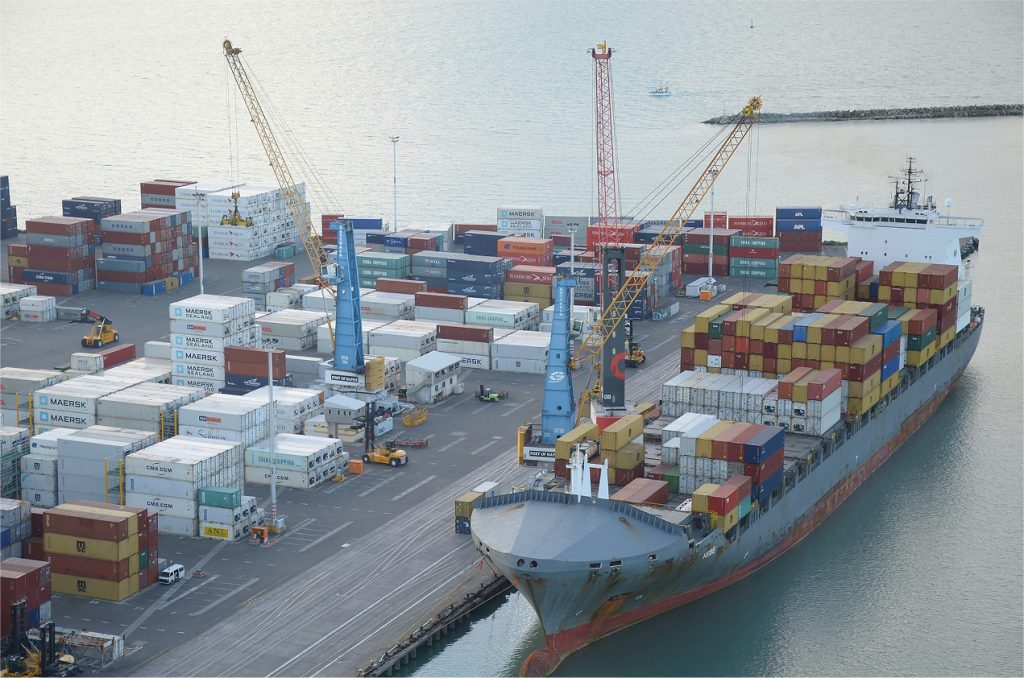
Section 2.5
Fight Back Against China’s Brute Force Economic Tactics
Chapter 02
Section 2.5
2.5A
Congress must require public companies to disclose single points of supply chain vulnerability located in foreign countries of concern.
2.5B
Congress must prohibit companies that work with U.S. national security agencies and the Department of Health and Human Services (HHS) from using certain Chinese biotechnology suppliers deemed to pose a national security threat.
2.5C
Congress should reform the Committee on Foreign Investment in the United States (CFIUS) to better and more nimbly screen the highest-impact, highest-risk types of investment in critical technology sectors in the United States.
2.5D
Congress should direct the International Trade Commission (ITC) to investigate Chinese dumping or oversupply of biotechnology products and services.
China devotes billions of dollars in state subsidies to prop up companies that would not withstand normal market forces. Its goal is not only to support Chinese biotechnology companies but also to court fledgling foreign firms that are struggling to commercialize their innovations. The CCP is even willing to subsidize national champions beyond the point of market viability, just to undercut companies based in the United States and allied countries.
China is taking advantage of the barriers to commercialization in the United States so it can enter and, in some cases, dominate markets. The U.S. government must therefore both remove those barriers and prevent China from using adversarial capital and non-market practices to undermine U.S. companies and gain control of strategic markets.
Recommendation
2.5A
Recommendation 2.5A
Congress must require public companies to disclose single points of supply chain vulnerability located in foreign countries of concern.
For companies seeking to maximize profits and minimize costs, relying on single-source suppliers has long been an attractive strategy. This approach often leads to short-term savings by concentrating orders with a limited number of vendors, resulting in lower operational and logistics costs. Many of these single-source suppliers are headquartered or have manufacturing facilities in China.186 These dependencies can cause problems for a company in times of global instability and conflict.
To de-risk future investments, the U.S. government must require companies to report their supply chain vulnerabilities. Greater transparency into potential supply chain vulnerabilities will help investors better assess risk and incentivize diversification, if needed.
Congress should direct the U.S. Securities and Exchange Commission (SEC) to require publicly held securities and companies of a certain size to file annual reports with the SEC disclosing the existence of single-source suppliers located in foreign countries of concern. This requirement would apply only to publicly held securities and companies involved in the production of technologies critical to U.S. economic and national security, including biotechnology.
Recommendation
2.5B
Recommendation 2.5B
Congress must prohibit companies that work with U.S. national security agencies and the Department of Health and Human Services (HHS) from using certain Chinese biotechnology suppliers deemed to pose a national security threat.
U.S. companies rely too much on firms located in China for the production and supply of critical biotechnologies. This reliance presents two vulnerabilities. First, sensitive business and biological data may be collected and shared with the Chinese government to support its military biotechnology ambitions. Second, the Chinese Communist Party (CCP) could instruct its state champion biotechnology companies to sever ties with their American customers, leaving the U.S. biotechnology industry without suppliers of key products and services.
Congress must pass legislation that prohibits companies that work with the DOD, the DOE, the intelligence community (IC), and the HHS from using Chinese biotechnology suppliers that are deemed to pose a national security threat.
These agencies are likely to have the most biotechnology-related transactions with the greatest national security impact. Chinese biotechnology companies that should be covered by this prohibition include those on the “Chinese military companies” list maintained by the DOD under Section 1260H of the 2021 National Defense Authorization Act (NDAA), those on the DOC’s Entity List, and any other company of “national security concern,” as designated by the President (with authority delegable to a cabinet secretary).
Companies would have an appropriate amount of time to wind down long-term contracts and move to less risky alternative suppliers, such as those based in the United States and allied countries.
Recommendation
2.5C
Recommendation 2.5C
Congress should reform the Committee on Foreign Investment in the United States (CFIUS) to better and more nimbly screen the highest-impact, highest-risk types of investment in critical technology sectors in the United States.
CFIUS is an interagency committee that reviews the national security implications of foreign investments in U.S. companies or operations. Its jurisdiction includes the review of mergers, acquisitions, and takeovers that result in foreign control of a U.S. business, along with non-controlling investments in U.S. businesses related to critical technologies, critical infrastructure, sensitive personal data, and certain real estate transactions.
Adversarial investments are a critical vector of vulnerability in the U.S. biotechnology industry. Before the 2018 Foreign Investment Risk Review Modernization Act (FIRRMA) expanded CFIUS’s purview, the committee failed to recognize the strategic importance of biotechnology and allowed Chinese companies to acquire strategic technologies and capabilities through foreign direct investments.
After FIRRMA, CFIUS has tried to prioritize strategic sectors such as biotechnology. But in practice, its mandate and resources are insufficient to protect against adversarial investment in emerging technologies.
The Commission’s analysis of past biotechnology-related CFIUS cases and the way FIRRMA has been applied have revealed four key vulnerabilities in current authorities.
First, current definitions for “critical technology” constrain the scope of CFIUS’s review. These definitions rely on static lists, such as the DOD’s U.S. Munitions List, the DOC’s Commerce Control List (CCL), and the DOC’s Section 1758 list of emerging and foundational technologies.187 CFIUS relies on the DOC’s Section 1758 list, but this list is updated infrequently.
Second, CFIUS does not currently have jurisdiction over “greenfield investments,”—whereby a company creates a completely new business operation in a foreign country via the establishment of new physical facilities—and has jurisdiction only over joint ventures that result in control of an existing U.S. business. Yet both types of transactions pose security risks. In 2022, CFIUS cleared the Chinese company Fufeng Group’s purchase of 370 acres of agricultural land in North Dakota, near the Grand Forks Air Force Base, because it deemed the transaction to be outside of its jurisdiction.188 Joint ventures, for their part, pose risks of intellectual property theft and technology transfer, even when a foreign company has a non-controlling interest.

Third, CFIUS is not mandated by law to analyze the control of strategic supply chains and markets in the course of its review process. Under the current statute, CFIUS may take into account “the cumulative control of, or pattern of recent transactions involving any one type of critical technology by a foreign government or foreign person” when considering national security risks, but it is not explicitly required to do so.189 Thus, the CFIUS review process can sometimes fail to prevent foreign adversaries from “slicing and dicing” market control of critical technology sectors through multiple transactions.
And finally, CFIUS has blanket review for covered transactions involving allied countries, in addition to countries of concern. Although there are exemptions for certain foreign states from CFIUS jurisdiction of nonpassive minority investments and real estate transactions (also known as the Excepted Foreign State and Excepted Real Estate Foreign States lists), the CFIUS review process does not differentiate between foreign adversaries and allies when assessing transactions related to critical technologies. As a result, CFIUS’s finite time and resources are spread across cases with differing levels of security risk when reviewing for certain covered transactions.190
The 2022 CFIUS Executive Order on Evolving National Security Risks and CFIUS enforcement guidelines (EO 14083) attempted to address some of these issues in investment screening for emerging technologies, including biotechnology.191 A February 2025 National Security Presidential Memorandum signaled further executive interest from the Trump Administration to improve CFIUS review and outbound investment screening for strategic technologies, such as biotechnology.192 However, there are limits to what can be accomplished solely through executive branch action without legislative changes.193
Congress should reform CFIUS to better and more nimbly screen the highest-impact, highest-risk types of investment into critical technology sectors in the United States. To ensure this, Congress should amend the FIRRMA to:
- Expand definitions of “critical technology” for CFIUS review. The legal definition of “critical technology” should be expanded in order to give CFIUS greater flexibility when screening investments by foreign adversaries in critical technology areas. Congress should direct the Secretary of the Treasury to review cases involving technologies of “national security concern,” and to enumerate any such technologies that meet this definition that are not covered by existing lists of critical technologies.
- Reform CFIUS review to no longer be “country-agnostic” for certain covered transactions. Congress should direct the Department of Treasury (Treasury) to generate an “excepted foreign state” list of allied countries that have investment security practices that are harmonized with those of the United States and whose transactions would go through an expedited review process. The Secretary of the Treasury would be given the authority to scrutinize investments originating in these countries only when there is evidence of undisclosed interests or control of a firm by a third country or when the Secretary of the Treasury (whose authority in this case would be non-delegable) determines that there is a significant national security risk in the proposed transaction.
- Expand CFIUS’s jurisdiction to include non-controlling joint ventures and greenfield investments when a country of concern is involved.
- Mandate that CFIUS analyze the control of strategic supply chains and markets as part of its review process.
Lastly, to effectively carry out its legislative mandate, Congress should provide Treasury with the resources it needs to modernize the digital systems that underpin CFIUS’s analysis and expand its analysts’ access to up-to-date business and other data.
Recommendation
2.5D
Recommendation 2.5D
Congress should direct the International Trade Commission (ITC) to investigate Chinese dumping or oversupply of biotechnology products and services.
China’s top-down strategies, subsidies, and anticompetitive practices often distort global markets. Without normal price floors or the economic pressure to maintain production in proportion to demand, Chinese firms have been able to flood global markets with cheap goods and acquire control of critical industries.
There is emerging evidence that China is distorting biotechnology markets in particular. Beijing Genomics Institute (BGI) and MGI Tech have financed their growth in an atypical manner that indicates undisclosed state involvement and subsidization, undermining their foreign competitors in the genomic sequencing market.194 China’s ability to manufacture active pharmaceutical ingredients (APIs) at disproportionately low prices led India to impose a unilateral anti-dumping duty on certain APIs from China in 2022 to protect its domestic manufacturing industry.195
If the ITC receives a petition or a Congressional directive, it has the authority and resources to investigate the material impact of foreign subsidies and market dumping on U.S. industry. The results of that investigation would inform executive branch action on any remedy (such as a tariff or a countervailing duty) that might level the playing field. Congress should direct the ITC to speedily investigate Chinese subsidization and production overcapacity in biotechnology that could economically harm the United States. If the ITC’s investigation confirms Chinese dumping and oversupply in the biotechnology industry, then the DOC’s International Trade Administration (ITA) can use this information to inform subsequent executive branch action. For example, for anti-dumping cases, the ITA can issue additional duties on imported items to offset the below-cost pricing. Similarly, for countervailing duties (CVD) cases, the ITA can issue duties equivalent to the subsidy amounts on the imported items.